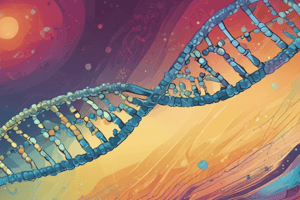Podcast
Questions and Answers
What was the significant contribution of Frederick Sanger to molecular biology?
What was the significant contribution of Frederick Sanger to molecular biology?
- Discovery of RNA structure
- Development of protein synthesis techniques
- Identification of amino acid structures
- Sequencing of DNA molecules (correct)
Which fundamental polymers of life did Frederick Sanger sequence?
Which fundamental polymers of life did Frederick Sanger sequence?
- Proteins, DNA, and lipids
- Proteins, RNA, and carbohydrates
- Proteins, RNA, and DNA (correct)
- DNA, enzymes, and proteins
What influenced Frederick Sanger's scientific career, as mentioned in the content?
What influenced Frederick Sanger's scientific career, as mentioned in the content?
- His father's Quaker beliefs (correct)
- His work with synthetic insulin
- His brother's interest in chemistry
- His father's military background
What was the title of Frederick Sanger's doctoral research?
What was the title of Frederick Sanger's doctoral research?
What major protein was sequenced by Sanger and marked the beginning of a surge in protein research?
What major protein was sequenced by Sanger and marked the beginning of a surge in protein research?
In what year did Frederick Sanger receive his first Noble Prize in Chemistry?
In what year did Frederick Sanger receive his first Noble Prize in Chemistry?
Who was exempted from military service during World War II due to his beliefs?
Who was exempted from military service during World War II due to his beliefs?
Where did Frederick Sanger conduct his research after receiving his first Nobel Prize?
Where did Frederick Sanger conduct his research after receiving his first Nobel Prize?
What did Sanger primarily aim to reveal through his sequencing methods?
What did Sanger primarily aim to reveal through his sequencing methods?
What major advancement did Sanger achieve in 1977?
What major advancement did Sanger achieve in 1977?
Which organism did John Sulston focus his research on?
Which organism did John Sulston focus his research on?
What significant contribution did Sulston make to genetics?
What significant contribution did Sulston make to genetics?
What technique did Sanger use to label individual DNA fragments?
What technique did Sanger use to label individual DNA fragments?
What was a challenge Sanger faced when sequencing DNA compared to RNA?
What was a challenge Sanger faced when sequencing DNA compared to RNA?
In what year did Sulston's research contribute to the start of the Human Genome Project?
In what year did Sulston's research contribute to the start of the Human Genome Project?
Which of the following methods was pivotal for Sanger's sequencing breakthrough?
Which of the following methods was pivotal for Sanger's sequencing breakthrough?
What was one of the primary fields of study for Frederick Sanger during his doctoral research?
What was one of the primary fields of study for Frederick Sanger during his doctoral research?
Which significant methodological advantage did Sanger claim as his strongest asset in research?
Which significant methodological advantage did Sanger claim as his strongest asset in research?
What was a major outcome of Sanger's sequencing of insulin?
What was a major outcome of Sanger's sequencing of insulin?
In what year did Sanger receive his second Nobel Prize in Chemistry?
In what year did Sanger receive his second Nobel Prize in Chemistry?
What influence did Sanger's father have on his scientific approach?
What influence did Sanger's father have on his scientific approach?
Which institution did Sanger join after winning his first Nobel Prize?
Which institution did Sanger join after winning his first Nobel Prize?
What was demonstrated about proteins through Sanger's sequencing work?
What was demonstrated about proteins through Sanger's sequencing work?
What personal circumstance allowed Sanger to focus on research during World War II?
What personal circumstance allowed Sanger to focus on research during World War II?
What was significant about Sanger's sequencing method for RNA compared to DNA?
What was significant about Sanger's sequencing method for RNA compared to DNA?
Which aspect of DNA sequencing did the dideoxy chain-termination method primarily address?
Which aspect of DNA sequencing did the dideoxy chain-termination method primarily address?
What was John Sulston's primary focus during his research on the nematode C. elegans?
What was John Sulston's primary focus during his research on the nematode C. elegans?
What did Sanger achieve by mapping the first human genome in 1981?
What did Sanger achieve by mapping the first human genome in 1981?
Which statement accurately reflects the contribution of the Wellcome Sanger Institute?
Which statement accurately reflects the contribution of the Wellcome Sanger Institute?
What makes Caenorhabditis elegans a suitable subject for genetic studies?
What makes Caenorhabditis elegans a suitable subject for genetic studies?
Which breakthrough was achieved by Sanger's laboratory in 1977?
Which breakthrough was achieved by Sanger's laboratory in 1977?
What role did John Sulston play in the Human Genome Project?
What role did John Sulston play in the Human Genome Project?
Flashcards
Who sequenced insulin?
Who sequenced insulin?
Frederick Sanger, a British biochemist, was the first person to sequence the complete amino acid sequence of insulin, a protein crucial for regulating blood sugar.
How did Sanger's work impact diabetes treatment?
How did Sanger's work impact diabetes treatment?
Sanger's work on insulin was a milestone in protein research, which led to the development of synthetic insulin for treating diabetes.
What was the significance of Sanger's insulin sequencing?
What was the significance of Sanger's insulin sequencing?
Before Sanger's work, the amino acid sequence of proteins was unknown. His groundbreaking technique revolutionized the field of biochemistry.
What was the impact of Sanger's DNA sequencing technique?
What was the impact of Sanger's DNA sequencing technique?
Signup and view all the flashcards
How did Sanger's Quaker beliefs influence his science?
How did Sanger's Quaker beliefs influence his science?
Signup and view all the flashcards
Who was Sanger's father?
Who was Sanger's father?
Signup and view all the flashcards
What sparked Sanger's interest in natural history?
What sparked Sanger's interest in natural history?
Signup and view all the flashcards
What did Sanger study in university?
What did Sanger study in university?
Signup and view all the flashcards
What is DNA?
What is DNA?
Signup and view all the flashcards
What is RNA?
What is RNA?
Signup and view all the flashcards
What is Sanger Sequencing?
What is Sanger Sequencing?
Signup and view all the flashcards
What is Dideoxy Chain-termination?
What is Dideoxy Chain-termination?
Signup and view all the flashcards
What is Genome Sequencing?
What is Genome Sequencing?
Signup and view all the flashcards
What is Caenorhabditis elegans?
What is Caenorhabditis elegans?
Signup and view all the flashcards
What is programmed cell death?
What is programmed cell death?
Signup and view all the flashcards
What is the Human Genome Project?
What is the Human Genome Project?
Signup and view all the flashcards
How did Sanger impact diabetes treatment?
How did Sanger impact diabetes treatment?
Signup and view all the flashcards
What was significant about Sanger's insulin sequencing?
What was significant about Sanger's insulin sequencing?
Signup and view all the flashcards
Why is Sanger's DNA sequencing technique important?
Why is Sanger's DNA sequencing technique important?
Signup and view all the flashcards
How was Sanger's pacifist stance reflected during WWII?
How was Sanger's pacifist stance reflected during WWII?
Signup and view all the flashcards
What influenced Sanger's scientific approach?
What influenced Sanger's scientific approach?
Signup and view all the flashcards
When did Sanger receive the Nobel Prize for his work on insulin?
When did Sanger receive the Nobel Prize for his work on insulin?
Signup and view all the flashcards
What did Sanger do after receiving his first Nobel Prize?
What did Sanger do after receiving his first Nobel Prize?
Signup and view all the flashcards
Programmed Cell Death (Apoptosis)
Programmed Cell Death (Apoptosis)
Signup and view all the flashcards
DNA (Deoxyribonucleic Acid)
DNA (Deoxyribonucleic Acid)
Signup and view all the flashcards
RNA (Ribonucleic Acid)
RNA (Ribonucleic Acid)
Signup and view all the flashcards
Sanger Sequencing
Sanger Sequencing
Signup and view all the flashcards
Dideoxy Chain-Termination
Dideoxy Chain-Termination
Signup and view all the flashcards
Genome Sequencing
Genome Sequencing
Signup and view all the flashcards
Caenorhabditis elegans
Caenorhabditis elegans
Signup and view all the flashcards
Human Genome Project
Human Genome Project
Signup and view all the flashcards
Study Notes
Frederick Sanger: Two-Time Nobel Laureate
- Sanger was an experimental biochemist who sequenced proteins, RNA, and DNA. His DNA sequencing techniques revolutionized molecular biology, and advanced fields like medicine, gene therapy, and genetics.
- He was born in 1918 in Gloucestershire, UK, and his early life was influenced by his brother's interest in nature and his Quaker father's beliefs.
- Sanger attended Cambridge University and graduated in 1939 with an interest in biochemistry.
- His parents died during his undergraduate studies and he used inherited funds for a self-funded PhD in amino acid metabolism.
- Due to Quaker beliefs about pacifism, he was exempt from WWII service and researched potato nitrogen uptake.
- He earned his PhD in 1943, highlighting the importance of research methodology.
- He joined a Cambridge team studying proteins and dedicated his efforts toward determining the complete amino acid sequence of insulin.
- This sequence, completed in 1955, showcased that every protein has a unique set of amino acids and a distinct three-dimensional structure. This work led to synthetic insulin production for diabetes treatment.
- Awarded the 1958 Nobel Prize in Chemistry for his insulin research; it was the first protein sequenced.
- In 1962, he moved to the Cambridge Laboratory of Molecular Biology, inspired by Crick and Watson's 1953 discovery of DNA's double helix structure.
- Sanger developed a method for RNA sequencing utilizing radioactive isotopes.
- He completed the RNA sequence of E. coli bacteria in 1967.
- The early 1970s saw his pivotal work in DNA sequencing. His team pioneered dideoxy chain-termination to isolate DNA fragments, leading to more efficient and accurate sequencing.
- By 1981, his team mapped the human mitochondrial genome.
- His methods facilitated the determination of the entire human genome's 3 billion base pairs. This methodology was crucial for the large-scale sequencing of the human genome.
John Sulston: Genome Research Pioneer
- English biologist John Sulston, the director of the Wellcome Sanger Institute, shared the 2002 Nobel Prize.
- His research focused on Caenorhabditis elegans, a minuscule nematode worm with a fixed cell count. This made it ideal for studying cellular processes, such as differentiation, division, and programmed death.
- In 1988, Sulston led the sequencing of C. elegans genome, a significant step for the Human Genome Project (1990-2003), of which he was a key contributor.
Studying That Suits You
Use AI to generate personalized quizzes and flashcards to suit your learning preferences.



